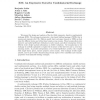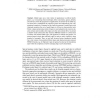457 search results - page 63 / 92 » Upper and Lower Bounds on Continuous-Time Computation |
JAIR
2008
13 years 7 months ago
2008
We present the design and analysis of the first fully expressive, iterative combinatorial exchange (ICE). The exchange incorporates a tree-based bidding language (TBBL) that is co...
FSTTCS
2010
Springer
13 years 5 months ago
2010
Springer
In mean-payoff games, the objective of the protagonist is to ensure that the limit average of an infinite sequence of numeric weights is nonnegative. In energy games, the objectiv...
ICLP
1997
Springer
13 years 11 months ago
1997
Springer
We provide a method whereby, given mode and (upper approximation) type information, we can detect procedures and goals that can be guaranteed to not fail (i.e., to produce at leas...
MFCS
2004
Springer
14 years 23 days ago
2004
Springer
We study constructive and resource-bounded scaled dimension as an information content measure and obtain several results that parallel previous work on unscaled dimension. Scaled ...
KI
2008
Springer
13 years 7 months ago
2008
Springer
Abstract. Modal logics see a wide variety of applications in artificial intelligence, e.g. in reasoning about knowledge, belief, uncertainty, agency, defaults, and relevance. From ...


